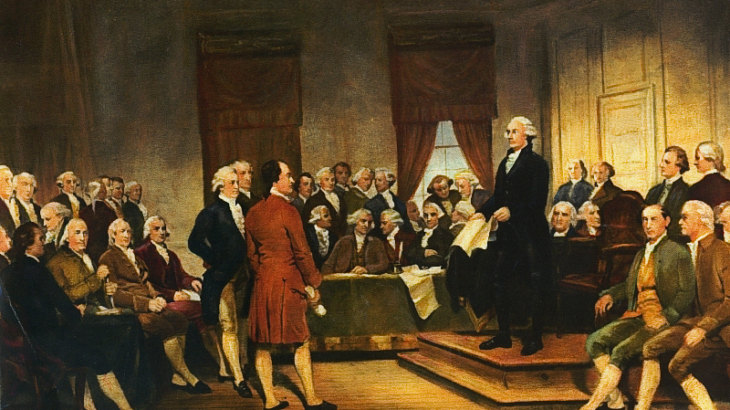Under Strict Limits: Principle of a Written U.S. Constitution, a Contract Allowing Government to Run Under Authority of the American People
 Essay Read by Constituting America Founder, Actress Janine Turner
Essay Read by Constituting America Founder, Actress Janine Turner
The brilliance of the United States Constitution lies not just in its innovative governance structure but in its foundational principle: that it is a written contract allowing, under strict limits, a government to run under the authority of the American people within the states. This principle, in fact, was not an accidental development but a conscious response to the concerns and criticisms prevalent in the post-revolutionary era. One such concern was voiced in a 1778 letter disparaging the American constitutions as inadequate in their republican form, claiming they replicated the tyrannies America sought to escape. It is to this concern that John Adams, a pivotal figure in the nation’s founding, offered a compelling defense.
Adams replied in his first letter which was part of his three-volume response written from 1787 to 1788:
“There are in the productions of all of them, among many excellent things, some sentiments, however, that it will be difficult to reconcile to reason, experience, the constitution of human nature, or to the uniform testimony of the greatest statesmen, legislators, and philosophers of all enlightened nations, ancient and modern.” – A Defense of the Constitution of Government of the United States of America, Letter I, Volume I, Preliminary Observations, John Adams, Grosvenor-Square, October 4, 1786
Even though, through his letters, Adams’ initial response is directed to the American state constitutions of the time, through this lens, the U.S. Constitution that would come later can be seen not just as a foundational document of a nation, but as a meaningful dialogue with history, philosophy, and human nature itself. His profound assertion draws attention to the uniquely American synthesis of reason, experience, and an informed understanding of human nature that undergirds the U.S. Constitution.
Adams’ defense provides an insightful understanding of the Constitution’s design. The reference to “reason, experience, the constitution of human nature” underscores the importance of these elements in the design of the Constitution. He acknowledges that no political document, including the American constitutions, can be free from imperfections. Yet, he contends that the United States Constitution, by grounding itself in human reason and experience, offers a robust framework for the functioning of a republic.
The Constitution’s written nature, as Adams seems to imply, is central to ensuring its efficacy as a contract between the people and the government. A written constitution provides a tangible and constant point of reference, a standard against which the actions of the government can be measured. In the context of the American Revolution, a written constitution was particularly significant. It represented a break from the unwritten traditions and discretionary powers that characterized the monarchy America was rebelling against.
Moreover, the Constitution goes beyond merely setting the rules of governance. Its provisions for separation of powers, checks and balances, and federalism were innovative measures to prevent the concentration of power – a direct response to the accusation of the American constitutions merely “repeating dictatorships.” These mechanisms ensure that no single entity within the government can dominate, thus safeguarding the people’s control over their government.
In the light of Adams’ emphasis on the “uniform testimony of the greatest statesmen, legislators, and philosophers of all enlightened nations, ancient and modern,” it is clear that the Constitution was not conceived in a vacuum. Instead, it was informed by a rich tradition of political thought. The Framers drew upon lessons from ancient Rome and Greece, Enlightenment philosophies, and contemporary political experiences. They sought to create a Constitution that would not only serve the immediate needs of the fledgling nation but also stand the test of time.
Moreover, they were influenced heavily by the country’s experience under the Articles of Confederation, the nation’s first written constitution. Its deficiencies, including the national government’s inability to act during Shays’ Rebellion (1786–87), exposed the need for a more robust central government capable of direct taxation and regulating interstate commerce.
Furthermore, the U.S. Constitution embodies the principle that the ultimate authority rests with the American people. This principle is most evident in the Constitution’s opening words: “We the People…” It is the people who are giving the government its power and setting its limits. The Constitution, therefore, is not an instrument of the government to control the people, but an instrument of the people to control their government. This is the essence of the republican form that the 1778 critique claimed was lacking.
The Constitution’s authors were acutely focused on limiting the power of government and securing citizens’ liberty. They sought to strike a balance between authority and liberty, embodying the central purpose of American constitutional law. To achieve this, they adopted the doctrine of legislative, executive, and judicial separation of powers, checks and balances, and explicit guarantees of individual liberty.
Integral to the Constitution’s design is the principle of a social contract—a fundamental agreement between the government and the governed. This social contract places the Constitution within the Enlightenment’s philosophical tradition, drawing upon ideas from ancient philosophy, English common law, English political theory, and the European Enlightenment.
However, this isn’t the complete picture of the Constitution’s influence. To fully comprehend its breadth and significance, it’s essential to understand John Adams’ quote in context. His argument suggests a keen awareness of the complexities and potential pitfalls of constructing a republic, a challenge the Framers of the U.S. Constitution had to grapple with—an awareness no doubt gleaned from his years of political work in the Continental Congress, where he saw firsthand the perils of unbridled power, fostered a deep-seated commitment to the principles of decentralization and individual liberty. It was Adams who famously remarked that “power must never be trusted without a check.”
Adams’ involvement in the negotiations leading to the unanimous vote on the Declaration of Independence further honed his views on the balance of power. He witnessed the states banding together in a common cause, each contributing to the struggle for independence while retaining their individual identities and rights. The unanimous vote was a testament to the power of cooperative federalism, a principle that would later be enshrined in our Constitution.
In crafting the Constitution, Adams drew on these experiences to advocate for a system of government that balanced the authority of the federal government with the rights of states and individuals. He championed the idea of a strong central government, yes, but one that was kept in check by the rights of states and the liberties of the citizenry. It is this delicate equilibrium, so cherished by Adams, that has allowed our republic to flourish.
For Adams, and for us, the essence of American liberty lies in this balance. His experiences in the crucible of independence shaped a vision of government that valued both the collective strength of the federal government and the individual freedoms of its citizens.
The United States Constitution stands as a beacon of American political philosophy, embodying a profound understanding of human nature, reason, and the wisdom of past statesmen, legislators, and philosophers. It is the embodiment of a social contract, firmly rooted in the principle of popular sovereignty. Yet, it is also a testament to the profound challenges and complexities involved in crafting a republic that is both robust and responsive to the needs of its citizens. To fully appreciate its significance, we must heed Adams’s words and reconcile its provisions with the wisdom that can only come from experience.
 Andrew Langer is President of the Institute for Liberty, as well as Chairman and Founder of the Institute for Regulatory Analysis and Engagement. IFL is a non-profit advocacy organization focused on advancing free-market and limited government principles into public policy at all levels. IRAE is a non-profit academic and activist organization whose mission is to examine regulations and regulatory proposals, assess their economic and societal impacts, and offer expert commentary in order to create better public policies. Andrew has been involved in free-market and limited-government causes for more than 25 years, has testified before Congress nearly two dozen times, spoken to audiences across the United States, and has taught at the collegiate level.
Andrew Langer is President of the Institute for Liberty, as well as Chairman and Founder of the Institute for Regulatory Analysis and Engagement. IFL is a non-profit advocacy organization focused on advancing free-market and limited government principles into public policy at all levels. IRAE is a non-profit academic and activist organization whose mission is to examine regulations and regulatory proposals, assess their economic and societal impacts, and offer expert commentary in order to create better public policies. Andrew has been involved in free-market and limited-government causes for more than 25 years, has testified before Congress nearly two dozen times, spoken to audiences across the United States, and has taught at the collegiate level.
A globally-recognized expert on the impact of regulation on business, Andrew is regularly called on to offer innovative solutions to the challenges of squaring public policy priorities with the impact and efficacy of those policies, as well as their unintended consequences. Prior to becoming President of IFL and founding IRAE, he was the principal regulatory affairs lobbyist for the National Federation of Independent Business, the nation’s largest small business association. As President of the Institute for Liberty, he became recognized as an expert on the Constitution, especially issues surrounding private property rights, free speech, abuse of power, and the concentration of power in the federal executive branch.
Andrew has had an extensive career in media—having appeared on television programs around the world. From 2017 to 2021, he hosted a highly-rated weekly program on WBAL NewsRadio 1090 in Baltimore (as well as serving as their principal fill-in host from 2011 until 2021), and has filled in for both nationally-syndicated and satellite radio programs. He also created and hosted several different podcasts—currently hosting Andrew and Jerry Save The World, with long-time colleague, Jerry Rogers.
He holds a Master’s Degree in Public Administration from Troy University and his degree from William & Mary is in International Relations.
Click here for First Principles of the American Founding 90-Day Study Schedule.
Click here to receive our Daily 90-Day Study Essay emailed directly to your inbox.


 https://en.wikipedia.org/wiki/Mayflower_Compact
https://en.wikipedia.org/wiki/Mayflower_Compact
Join the discussion! Post your comments below.
Your feedback and insights are welcome.Feel free to contribute!